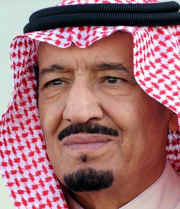 |
 |
This year's Riyadh Book Fair, held in the Saudi capital earlier this month, acknowledged the war in Yemen with a military theme. Hala Aldosari writes:
Guests browsing publishers’ stalls passed through “barracks row” honouring the Saudi troops camped on the border with Yemen. At the opening ceremony, official speeches celebrated the patron of this year’s book fair, King Salman, as “decisive,” “intellectual,” and “enlightened.”
The speeches were followed by a performance by the children of soldiers who have been killed in combat, chanting similar battle-fuelled odes to patriotism. In the background, pictures of Crown Prince Mohammed bin Nayef embracing the children of fallen soldiers and observing military parades were displayed, interspersed with photographs of the king or his son, Deputy Crown Prince Mohammed bin Salman.
In previous years the fair has also been a battleground in Saudi Arabia's internal religious/cultural war. The 2011 fair was disrupted by thugs – allegedly members of the religious police – complaining of "immoral practices" which included gender-mixing and the presence of "questionable books and authors".
Last year, the religious police halted a seminar entitled "Youth and Arts ... A Call for Coexistence" after one of its speakers, Dr Mojab al-Zahrani, condemned the destruction of ancient monuments by ISIS. The religious police accused him of supporting idolatry and interrupted the proceedings with a call to prayer.
Other reported incidents have included a male bookseller being told never to speak to female customers – "Keep silent and don’t acknowledge them when taking their money" – and a Kuwaiti author being instructed not to smile during his book-signing ceremony because the dimples on his face "would be too distracting".
This year's fair opened with the authorities trying to show a more liberal image – at least for the first day when dignitaries, foreigners and the media attend. Aldosari continues:
The state-sanctioned women’s presence in the opening ceremony showed an interesting progressive trend. The Ministry of Information and Culture selected a woman television presenter, whose hair was only half covered, to introduce the opening ceremony. Small numbers of invited women appeared in the same seating area as men, many dressed in colorful clothing.
The television coverage showed a foreign woman in western dress accompanying the minister of information and culture’s team while touring the fair. Surprisingly, the ministry honoured Saudi stage actors and actresses and in the minister’s speech at the fair, he referred to theatre as the beacon of artistic expression – a gesture that is indicative of some political leniency on socio-religious taboos in the kingdom like acting, gender mixing, and women not adhering to dress codes.
However, after the first day things reverted to what, in Saudi Arabia, passes for normality:
The tolerance apparent during the opening ceremony day, which included affluent local and international guests, was missing from the other days of the fair dedicated to locals. As in prior years, authors’ signing corners and panels of speakers had separate spaces for women and men. Novelists and poets were invited to read their work but without discussion afterward with the audience. The state religious police presence has been less notable in the last two years, however religious surveillance has been conducted by unofficial, though sanctioned, religious groups.
According to Arab News, this year's fair attracted 376,000 visitors and some 1.2 million titles were on display, covering science, technology, history, literature, politics, religion, languages, geography, medicine, engineering, education and communication. As always, the challenge this presents for the authorities is how to be seen to promote knowledge without allowing visitors to pick up any "misguided" ideas. This year, Arab News says ...
There was almost a total lack of books on the Muslim Brotherhood and Daesh, or books which could cause misunderstanding or controversy between Sunnis and Shiites.
In addition, there were some books withdrawn, such as the books of controversial Egyptian writer Nawal el Saadawi, an extremist advocate of women’s rights, due to a demands [sic] by visitors to the fair.
Under-the-counter sales of unapproved books are also viewed as a problem. In 2014, more than 10,000 copies of 420 different books were seized during the fair. This year they tried a different approach, with electronic tracking of the titles being sold.

Women and children queue for the Riyadh Book Fair. Photo posted on Twitter by @Khushal
Posted by Brian Whitaker
Tuesday, 29 March 2016

 RSS Feed
RSS Feed

